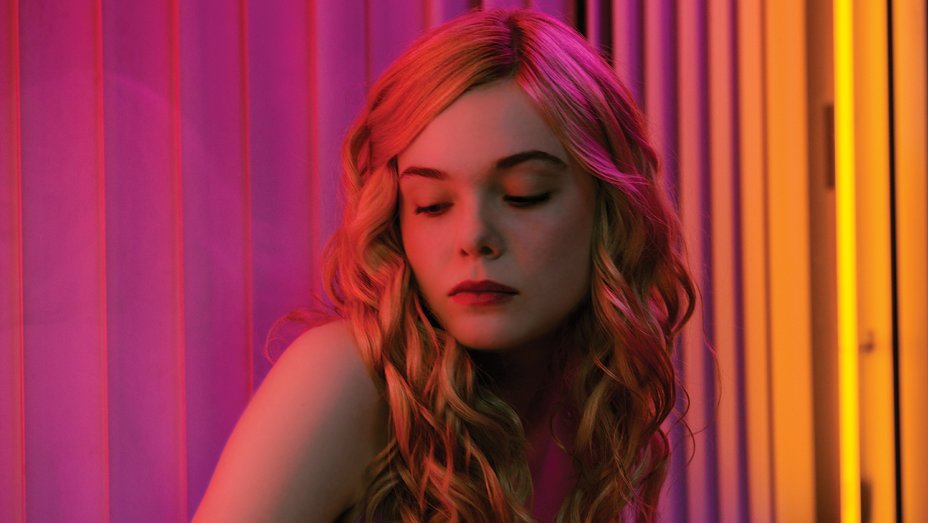The Only Thing, by Tyler Smith
24 Jun
“Beauty isn’t everything. It’s the only thing.”
So says a particularly incisive fashion designer in Nicolas Winding Refn’s The Neon Demon. The quote is a bit on the nose, but certainly seems to be the mantra of Refn himself. His films have always been visually striking, even when treading familiar narrative ground. Refn’s ability to marry sound and image, crafting an overall tone that is both jarring and haunting, distinguishes him as one of the most unique directors working today. And while I haven’t always responded to the stories Refn has chosen to tell – and felt them to be somewhat incongruous with the style with which he tells them – The Neon Demon seems like the film he was born to make. Finally, the vapid shallow beauty inherent in Refn’s preferred filmmaking choices matches that of the characters we’re watching. The film is ultimately gorgeous, meditative, and extremely trashy, making it one of the most interesting cinematic experiences of the year.
The story involves a young woman named Jesse (Elle Fanning) arriving in Los Angeles to break into the modeling industry. She is taken under the wing of photographers, designers, and fellow models, who all see something intangible in her. She is not merely beautiful; she is ethereal. As her star begins to rise, it awakens the insecurities of those around her and they must decide how to respond to their own impending obsolescence.
The three people most affected by Jesse’s success are models Gigi (Bella Heathcote) and Sarah (Abbey Lee), as well as make-up artist Ruby (Jena Malone). These characters – like everybody else – are both drawn to and provoked by Jesse’s rise. It is as though Jesse has a gravitational pull, with the fashion industry slowly beginning to revolve around her. But, once close enough, people’s own fear and envy kick in. And, as interesting as Jesse is, played with a seemingly-naive worldliness by Fanning, it is in the other characters’ response to her that we are treated to some fascinating development, exquisitely executed by the performers.
Gigi and Sarah are experienced models, and have a practiced dismissal in everything they say. And yet, as one would expect, there is an undercurrent of fear and paranoia in the performances of Bella Heathcote and Abbey Lee. Thankfully, this isn’t too telegraphed, lest they betray (both to the audience and others in their industry) that their nonchalance is just a front. While Jesse may officially be the lead of the film, these two characters and their silent panic is just as mesmerizing to watch as anything that Jesse does.
The other actors, such as Alessandro Nivola and Karl Glusman, turn in interesting performances, but special attention must be paid to Keanu Reeves, whose motel manager goes from merely sleazy to casually menacing with relative ease. It has been interesting to see the type of actor Reeves has become as he has gotten older, and this performance is a good argument for why we can’t write Reeves off as a bland action hero; age has brought with it insight and nuance that serves the character well. I come away from the film genuinely interested to see what Keanu Reeves does next.
Perhaps the most fascinating character in the film is Ruby, whose cattiness doesn’t hide fear, but extreme loneliness. She is the first to take Jesse under her wing. This could be for reasons of attraction, or simple companionship. As the two grow closer, Ruby’s intentions reveal themselves, and her eventual reaction to this is both heartbreaking and frightening. Like Reeves, Jena Malone has become a much more interesting screen presence as she ages and embraces her inner character actor. Her scene-stealing performances in films like Inherent Vice and the Hunger Games series have shown how willing she is to adapt to the style of the film she’s in. As Ruby in The Neon Demon, however, we get more than affectation; we get a fully crafted character who is the heart and soul of the film (for both good and ill). This is Jena Malone’s best performance.
While I don’t want to fall into the standard practice of brushing aside Refn’s characters in favor of his visual style, it almost can’t be helped. Thankfully, in this film, the two go hand-in-hand. We are watching beautiful people photographed beautifully. And while Refn has always had a way with on-screen color, his work with cinematographer Natasha Braier is particularly striking. The way the shots are composed, lit, and colored seems appropriate to the world they are capturing. This is a world of careful, meticulous ornamentation, and Refn and Braier follow suit in the way they photograph it.
The haunting nature of the visual style is heightened by Cliff Martinez’s playful, dangerous musical score. Martinez has turned in good work for Refn in the past, but here he is pushed beyond his usual atmospheric tones into something much more visible. This is not a score that is content to fade into the background, toying with your unconscious. This is music that insists you hear it, just as much as the models insist that you see them. It is a bold and memorable piece of work and, while I’m not sure I’d call it a career best for Martinez, it is very close.
All of these elements – the visuals, the sound, the pacing, the characters – add up to a movie that desires to explore the nature of outer beauty, and the price that it can exact on the inner life. The film begins as a meditation and ends as a true horror show, never blinking its heavily-made up eyes. It may not be the deepest idea for a film, but by delving into it in his signature style, Nicolas Winding Refn has managed to make The Neon Demon an exciting and memorable film that is quite possibly the movie that he, and he alone, was uniquely qualified to make.




No comments yet